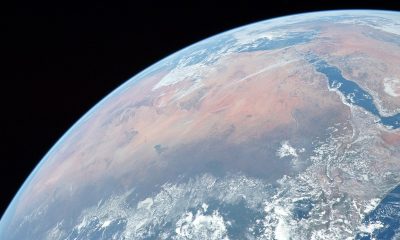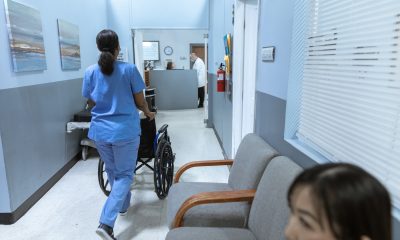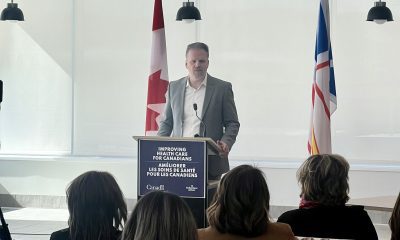News
Out in the cold: Refugees get no good news at Greek border

A Syrian family reaches Greece.
(Photo by Mathias Depardon/United Nations Commission on Human Rights)
IDOMENI, Greece – Hassan Rasheed’s papers have been cleared but the Iraqi refugee has spent days freezing in a tent with no tarp on the ground and flaps that don’t close, one of 10,000 migrants stuck at a muddy camp on the border of Greece and Macedonia.
They’re hoping for a breakthrough in Europe’s troubled negotiations on how to handle the deepening crisis. But there was little sign of that Tuesday.
Austria’s chancellor insisted he would not to let his country become a “waiting room for Germany,” while authorities from four ex-Yugoslav countries on the migrant route vowed closer cooperation to keep people out.
“I’ve been at Idomeni for 10 days and it’s the fourth day I’ve been waiting to cross over,” the 27-year-old Rasheed said. “Conditions are very bad. There are many ill children who are coughing, and we spent the night in this tent under heavy rain.”
The heavily policed border, marked by a twin fence and coils of razor wire, remained closed a day after migrants attempted to push through the barriers and were forced back by Macedonian riot police using tear gas and stun grenades. Before that, sporadic closures since Feb. 19 had slowed the number allowed through to just dozens a day.
Overnight, rain soaked many families, who hung up clothing to dry Tuesday on the border fence.
More exhausted refugee families continued to reach the burgeoning tent city in this Greek border town on foot or by taxi. Many walked up to 30 kilometers (18 miles) along Greece’s northern highways.
Ahmed Majid, a 26-year-old Iraqi, was traveling with his wife and two young children.
“We have been walking for three kilometers. Police stopped our taxi on the highway, which is why we are going through the fields,” he said.
About 2,000 migrants are still reaching Greek islands from nearby Turkey every day, despite the recent deployment of NATO ships in the east Aegean Sea.
European Council President Donald Tusk was in Austria on Tuesday to try to persuade Chancellor Werner Faymann to change his mind about the country’s decision to accept no more than 80 asylum requests a day at Austria’s southern frontier with Slovenia.
But Faymann said Austria was determined not to accept the “policy of waving through” migrants to the rest of the EU.
“Austria is not a waiting room for Germany,” he said. “This disorganized chaos must end… It’s important to have clarity on the EU’s external borders. (Otherwise) Austrians have to be active on their borders.”
Meanwhile, Austria’s interior minister, Johanna Mikl-Leitner, announced plans by her government to launch an advertising campaign in Afghanistan – including billboards, TV ads and public bus banners – to discourage Afghans from trying to reach Europe.
Tusk added a stop in Ankara to his schedule, ahead of next week’s summit of leaders from the EU and Turkey on migration.
To prepare for the summit, German Chancellor Angela Merkel was to meet French President Francois Hollande in Paris on Friday, and she remained vocally opposed to the Austrian border closure.
“We must stand with Greece,” a spokesman quoted the chancellor as saying on a Twitter post. “I am therefore in constant contact with (Greek Prime Minister Alexis) Tsipras.”
In Athens, the government said it has requested 480 million euros ($520 million) in aid for the refugee crisis from the EU, under an emergency plan to cope with as many as 100,000 stranded refugees – roughly three times the number now stuck inside Greece.
Athens is pressing EU countries to honor pledges to accept asylum seekers directly and for Turkey to help speed up deportations. The government said 69 people from North Africa considered ineligible for asylum were deported to Turkey, with another 230 people due to be sent back by Wednesday.
The impasse in Greece drew strong criticism from the United Nations refugee agency, which warned that Europe “is on the cusp of a largely self-induced humanitarian crisis.”
A UNHCR statement said inconsistent policies on the continent, which faces its worst immigration crisis since the end of World War II, “are causing unnecessary suffering and risk being at variance with EU and international law standards.”
New York-based Human Rights Watch blamed “discriminatory border closures” and the cap imposed by Austria for the crisis.
“Trapping asylum seekers in Greece is an unconscionable and short-sighted non-solution that is causing suffering and violence,” said the right’s group’s Greece specialist, Eva Cosse.
“It demonstrates once again the EU’s utter failure to respond collectively and compassionately to refugee flows.”
___
Jahn reported from Vienna. Associated Press writers Konstantin Testorides in Skopje, Macedonia; Jovana Gec in Belgrade, Serbia and Derek Gatopoulos, Nicholas Paphitis, and Elena Becatoros in Athens contributed to this report.





















